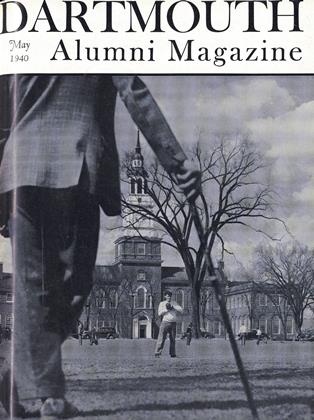Plus a Review of Harold O. Rugg's Controversial Civics Book, Safford's "Tristram Bent" and Others
Poems by Kimball Flaccus '33. New York, Charles Scribner's Sons, 1940. $2.50.
MANY DARTMOUTH ALUMNI have been stirred in one way or another by the frescoes José Clemente Orozco painted on the walls of Baker Library. But Kimball Flaccus, of the class of 1933, has realized most perfectly one of the original beliefs of those who were responsible for bringing Orozco to Hanover, the belief that entirely aside from the value of the completed frescoes as art, the presence here of an artist of Orozco's stature, actively at work, was in itself a stimulating thing for the undergraduate life of the college. Mr. Flaccus, who as an undergraduate of the Orozco era occasionally used "to sit on the scaffold with him and help him mix his paints," was moved to interest in the story of Quetzalcoatl depicted in the first panels of the fresco, and now in his second book of poems, The WhiteStranger, principal place is given to "Quetzalcoatl," a fine and moving verse drama in three acts.
For his purpose Mr. Flaccus has taken the outline of the Quetzalcoatl legend: the coming of the god, the civilizing influence, the opposition by the Necromancer, and the sailing away of Quetzalcoatl on the serpent raft, has filled in the outline with his own imaginative detail, built up a love story between a Toltec queen and a young lord in her service, given the story significance for a contemporary wartorn world, and cast the whole in classical dramatic mold.
The result is a swiftly moving play containing many passages of finely wrought poetry. If at times one wishes for a little more gold and thunder, one is impressed by Mr. Flaccus' unfailing ear for the melody of words, by his sensitive perception, by his obvious command of his verse forms, and by his work in such particular parts as the chorus that opens Act One, the High Priest's address to the crowd on page 15, the Messenger's report to the Queen on page 40, the later scenes involving the Necromancer, Quetzalcoatl's speech of farewell, and the Epilogue. And one is impressed by the whole conception.
The rest of Mr. Flaccus' book is devoted to shorter poems on various themes. Outstanding, to this reviewer's mind at least, is "Islanders," with its litheness of line and the strong arresting quality of its pictures, one of the best things that Mr. Flaccus has ever done. Outstanding too are "The Maiden and the Cup of Sure Escape" and the rigorous and personal memorial, "Letter to Thomas Wolfe." Mr. Flaccus has gained in strength and precision since his first book. He definitely establishes himself as one of the best of the younger poets writing in the traditional forms of English poetry although not necessarily on the traditional themes, writing, in short, for the world of today.
 View Full Issue
View Full Issue
More From This Issue
-
 Article
ArticleDartmouth Mourns Passing of Craven Lay cock
May 1940 -
 Article
ArticleI Found Seven Latinos
May 1940 -
 Article
ArticleJohn M. Mecklin, Teacher
May 1940 By Thomas W. Braden '40 -
 Class Notes
Class Notes1915*
May 1940 By CHARLES R. TAPLIN, RUSSELL B. LIVERMORE -
 Article
ArticleHanover Browsing
May 1940 By HERBERT F. WEST '22 -
 Class Notes
Class Notes1918*
May 1940 By ERNEST H. EARLEY, H. WARREN WILSON
Kenneth A. Robinson
-
 Books
BooksWALT WHITMAN IN ENGLAND
October 1934 By Kenneth A. Robinson -
 Books
BooksTHE FIRST CENTURY OF AMERICAN LITERATURE
October 1935 By Kenneth A. Robinson -
 Books
BooksHOW TO BECOME PRESIDENT
November 1940 By Kenneth A. Robinson -
 Books
BooksFINGERBOARD
April 1950 By KENNETH A. ROBINSON -
 Books
BooksTABARD
October 1951 By Kenneth A. Robinson -
 Books
BooksWALT WHITMAN RECONSIDERED.
December 1955 By KENNETH A. ROBINSON
Books
-
 Books
BooksFACULTY PUBLICATIONS
MARCH, 1928 -
 Books
BooksThe Moosilauke Ravine Lodge?
June 1962 -
 Books
BooksAVALANCHE OF APRIL
December 1934 By Franklin McDuffee'21 -
 Books
BooksPATRIOTISM AND NATIONALISM — THEIR PSYCHOLOGICAL FOUNDATIONS.
APRIL 1965 By LLOYD H. STRICKLAND -
 Books
BooksHOW TO ADOPT A CHILD.
JULY 1967 By MICHAEL L. SLIVE '62 -
 Books
BooksAMERICAN LIFE AND THE SCHOOL CURRICULUM
January 1937 By William F. Geiger '92

